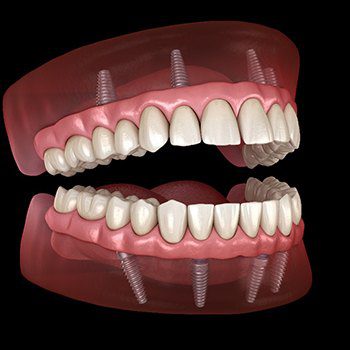An Outstanding Solution For Missing Teeth
At Shwarts Family Dentistry in Dallas, we know it’s natural to be concerned about your ability to eat, speak, and laugh with confidence after tooth loss. But rest assured that we can replace your missing teeth with beautiful, high-quality dentures to give you the function and appearance of a complete smile again. With a variety of options to meet everyone’s needs, Dr. Shwarts will work with you from start to finish to make sure you love your results. If you’re missing teeth and want to know how dentures in Dallas can help you, contact us today to schedule a consultation.

Limited Time Special Offer
$500 off Accepted Invisalign Treatment
- Free Records plus…
- Take Home Teeth Whitening
…at treatment completion.
($1,300 Value)
Call 972-437-6035 or email us using this form to schedule an appointment or for more details!
Why Choose Shwarts Family Dentistry in Dallas For Dentures?

WHO’S A GOOD CANDIDATE FOR DENTURES?
Anyone who has lost several teeth or all of their teeth can benefit from dentures. With that said, each patient has a unique medical and dental history, which we’ll closely evaluate before making a recommendation. In addition to assessing your gums and jaws, Dr. Shwarts will also look at your age, budget, oral hygiene habits, and lifestyle choices such as smoking. His goal is always to make sure your treatment successfully serves your needs over the long term.
According to the American College of Prosthodontists, the most common reasons why people lose their teeth include tooth decay, gum disease, and trauma. When you are missing teeth, you are bound to experience some negative consequences. Here are just some of them:
- Lower Confidence: When you have gaps in your smile, you may feel less confident about your appearance. This can affect both your professional and personal lives.
- Difficulty Speaking: Without all of your teeth in your mouth, it can be difficult to express yourself clearly. This can make it much more challenging for people to understand you clearly.
- Facial Sagging: When you are missing teeth, the muscles in your face aren’t being supported. This can make your cheeks appear hollowed out and your lips can become wrinkled prematurely. Both of these characteristics will make you appear older.
- Difficulty Eating: Chewing your food thoroughly is important for proper digestion and absorbing the vitamins and minerals you need.

If you don’t make a good candidate for dentures, other options may be ideal for you. You may want to consider the following:
- Dental Bridges: If you are only missing one or a few teeth a dental bridge is likely ideal for you. A dental bridge requires healthy teeth surrounding the missing tooth or teeth to support it.
- Dental Implants: To support one or more replacement teeth, a titanium post is inserted into the jawbone, so patients must have a solid bone structure. This option is more costly than traditional dentures, but it’s intended to last for many decades.

If you don’t make a good candidate for dentures, other options may be ideal for you. You may want to consider the following:
- Dental Bridges: If you are only missing one or a few teeth a dental bridge is likely ideal for you. A dental bridge requires healthy teeth surrounding the missing tooth or teeth to support it.
- Dental Implants: To support one or more replacement teeth, a titanium post is inserted into the jawbone, so patients must have a solid bone structure. This option is more costly than traditional dentures, but it’s intended to last for many decades.

DIFFERENT TYPES OF DENTURES
Full dentures replace all the teeth in the upper or lower arch. They’re made with a gum-colored acrylic base that has prosthetic teeth set into it. Traditional full dentures are removable and stay in place through natural suction and denture adhesive. To keep them comfortable, they should be removed and cleaned each day with special products designed for denture care. With daily maintenance on your part and periodic adjustments from Dr. Shwarts, you can expect your dentures to last 5-10 years before needing a new set.
If you have several healthy remaining teeth in either the upper or lower arch, a partial denture may suit your needs perfectly. This is especially true if you’re looking for a low-cost or temporary alternative to a bridge or implants. This appliance is made with a plastic base or metal framework that includes prosthetic teeth to “fill in the gaps” where needed. A partial fits around your remaining teeth with clasps and should be removed and cleaned each day.
While traditional full and partial dentures are certainly a great option, dental implants can make them even better. Typically, just 2-8 implants are needed per arch and will give you multiple advantages over traditional appliances. First, implant-retained dentures stay more securely in place, giving you unmatched strength and stability while also feeling more natural. In addition, your implant denture will continue fitting well for significantly longer, without the need for as many adjustments. You won’t have to worry about embarrassing “slips” during conversations the way you might with a traditional denture. Finally, implants preserve your jawbone and help you maintain a more youthful facial structure over time.


HOW DENTURES ARE MADE
When meeting with your denture dentist, you will learn not only if you’re a candidate for treatment but also how dentures are made in Dallas. Not only does this give you greater insight into the way your new teeth are created, but it also sheds light on what you can expect once they are properly fitted and inside your mouth. Our team is always happy to answer any of your questions but feel free to review the following details about denture creation before your appointment.
As fully customizable prosthetic teeth, dentures have been around for centuries helping patients reclaim their smiles. Made up of a base and artificial teeth, they mimic the look of a natural smile and deliver improved bite force and chewing ability.
Although there are two options for traditional dentures – partial and full – their bases are commonly formed from acrylic materials but may be crafted from porcelain, resin, metal, or nylon instead. With the ability to match a person’s gum color, they blend in beautifully for a more natural aesthetic. Another component of the base is the way they are attached. Partials include metal clasps or clips that attach to natural teeth, while full dentures use suction and denture adhesive.
The artificial teeth that are created for dentures are fabricated from resin or porcelain. Whether it is a full arch or only three or four teeth that need to be placed to fill in gaps, the materials used offer a natural look and feel that mimics tooth enamel and provides a more confident appearance.

Denture creation is a multi-step process that is handled by skilled lab technicians. Because each piece must be perfectly in line with all other components, it takes time to fabricate these prosthetics. However, once they are finished, patients can expect to be pleased with the results.
From measuring your jaw and taking impressions by our dental team to sending them off to the lab for the complete creation, it is a labor of love that goes into every denture that is produced.
Lab technicians build the artificial teeth as well as the base before using specialized instruments to hold everything together. After completing additional steps with wax dentures, you will try on the model to determine how it will fit. After making the necessary adjustments, you’ll go home with temporary ones so that you have something to wear while waiting for your finalized dentures.
Back at the lab, technicians use hot, boiling water to help melt any wax while a denture mold is created. Once any plaster is removed, your teeth are trimmed down and polished before begin delivered to our office.

After receiving your dentures, you can begin to enjoy life with a new set of teeth. However, there is an adjustment phase that you may not expect. Because of these foreign objects inside your mouth, you’ll likely develop a slight lisp that, with practice, will go away quickly. Also, you’ll need to learn how to eat without your dentures shifting out of place. Eating soft foods early on will help you to ease into a normal routine until you become more comfortable consuming more solid foods.
If you prefer, you have the option to add a denture adhesive to help hold your teeth in place while eating and speaking.

WHAT ARE THE BENEFITS OF DENTURES?
Dentures are some of the most reliable tooth replacements available for renewing missing teeth. If you’ve been struggling with tooth loss, these custom and natural-looking prosthetics can help you enjoy your full bite as well as appreciate showing off a nice smile again. Here are several benefits you can expect from dentures.


Do you typically cover your mouth when talking or laughing because you’re missing some or all of your teeth? With tooth loss, many people tend to experience lower self-esteem due to their situation. This can make it difficult for you to enjoy social interactions or activities, or you might forego them altogether. With dentures, you can rebuild your smile as well as reduce anxieties about the way you look, your chewing, and your speech!

Generally speaking, we need our tongue and lips to be properly positioned against our teeth to pronounce particular words and noises. If you’re missing some of your pearly whites, this can make it challenging for you to speak. By replacing them with dentures, you’ll be free to talk effectively like with your natural teeth. This can take some time to get used to, but some practice and repetition go a long way.

Without all of your teeth, you may experience difficulties when chewing your food. Since you won’t be able to do this as efficiently as before, you could end up risking issues like malnutrition and indigestion. Getting the majority of your bite back with dentures can be the game-changer you need when it comes to enjoying your meals. You’ll be able to expand your diet, allowing you to choose foods that promote better oral and overall health.

Whenever you lose teeth, your jawbone can start to shrink or deteriorate from a lack of stimulation from tooth roots. This can then cause any other remaining natural teeth to move out of position to fill the space. To avoid this, you can get dentures to support your existing teeth. Not only will they prevent dental shifting, but they can also help avoid wear and tear on your smile due to the pressures of chewing.

In most cases, people will notice your smile when meeting them initially. This makes having a full bite important when preparing for a job interview or even a date. If you want a reliable and cost-effective way to make a good impression, consider replacing your missing teeth with dentures. With these prosthetics, you can enjoy a boost to your social interactions and professional opportunities.
Over 35 million Americans have successfully used dentures to restore their smiles. If you’d like to learn more about how they can improve your dental health, give us a call today!

UNDERSTANDING THE COST OF DENTURES
Dentures are personalized to meet your exact specifications, which is why there is rarely a specific cost for any one denture. However, there are factors you can take into account before you complete treatment. To learn more about them, keep reading below so you can stay informed ahead of your tooth replacement consultation.
The three most important factors that influence the overall cost of your dentures include the following:
- Preparation – This may include treatments like tooth extractions to remove decayed teeth or gum therapy to address gum infections beforehand
- Acrylics – The type of acrylics used for the base can be higher or lower quality depending on your budget and are color-matched to blend in with your gums
- Replacement Teeth – The teeth used for your denture can be made from either acrylic or porcelain, with the latter being the more expensive variety
Keep in mind that cheaper is not typically better. For something that’s going to be kept in your mouth for hours (and years) at a time, it’s better to invest in something that is of high quality and designed to last!

Implant dentures require the placement of dental implants before the restoration can be attached, which inherently makes the treatment more expensive. As a result, your tooth replacement will not slip out of place or shift while in use, making them more permanent and lifelike overall. Additionally, implant dentures largely pay for themselves in the long-term when you’re not forced to pay for replacement dentures (which occurs every 5 to 7 years on average).

Most of the time, dental insurance will provide some level of coverage for dental insurance. However, they generally only offer to pay for some of the costs associated with treatment. The level of coverage you receive will depend on the plan provided by your insurance company and can fall anywhere between 80% and 50% coverage. Our team is more than prepared to help guide you through the process of confirming your benefits so you get the best value possible.

Just because you don’t have dental insurance doesn’t mean you can’t still make your care affordable. Those who need to fit dental services into a budget can look into our office’s financing options. Not only do our solutions allow you to enroll into payment plans that range between 6 and 36 months in length, but you can expect little to zero interest attached in many cases. Additionally, our VIP Member Plan provides discounts on many services, including 15% on dentures!
If you’d like to learn more, please give our office a call to set up a consultation dedicated to dentures!

DENTURE AFTERCARE
Ultimately, dentures can and will restore your smile to working order. That’s the whole point of getting these restorations! Still, having prosthetic teeth doesn’t mean you no longer need oral care. Dentures require daily upkeep and a healthy mouth to function. Otherwise, they’ll end up causing oral health problems in the long run. Thankfully, Shwarts Family Dentistry has tips on caring for dentures in Dallas. To learn about them, just keep reading or call us for the details!


First of all, remove and rinse your dentures after meals. This habit prevents a severe buildup of food debris and plaque. As a result, it leaves you better protected from oral infections.
At the same time, don’t use hot water for the after-meal rinses. Denture material warps when exposed to high temperatures. Consequently, rinsing with overly hot liquid could make your dentures not fit well.
In addition to the post-meal rinses, dentures also require once-daily cleanings. These remove harmful bacteria that naturally cling to your prosthetic teeth.
Once they’re out of your mouth, it’s simple to clean dentures. Just brush them with a soft-bristled toothbrush and some hand or dish soap. However, don’t include toothpaste in this process, as its abrasiveness harms dentures.
Follow up the brushing by soaking the dentures in a cleansing solution. From there, rinse the restorations before putting them back in your mouth.
Despite their durability, dentures aren’t invincible; they can be broken with enough force. With that being the case, you’ll need to keep them safe.
Various options exist for protecting your dentures. For example, use a towel to protect it from falls during cleaning. Another idea is to store your dentures away from kids or pets. After all, such groups can easily break your new teeth by roughhousing.
However natural they might feel, you shouldn’t wear dentures to bed. These prosthetic teeth aren’t designed for overnight use. Instead, take them out before bed. You could even place them in a denture-soaking solution.
The fact is that wearing dentures to bed is bad for you. Doing so restricts your gum circulation, for one thing, leading to soft-tissue irritation. It also increases your mouth’s plaque levels and raises your risk of pneumonia.
Watch for changes in your mouth or dentures to the extent that you can. (These include mouth sores, gum irritation, or signs of infection.) Depending on the shifts in question, you may need Dr. Shwarts for help.
If the changes include denture damage, don’t try to repair things yourself. You’d likely harm the restorations further. Instead, call our office – we could reline or replace the prosthetics.

Since they rely on dental implants, All-on-4 dentures have unique care steps. These are the following:
- Twice-Daily Brushing – Brush your dentures twice daily with a soft-bristled toothbrush and a non-abrasive toothpaste.
- Once-Daily Flossing – Floss your replacement teeth once a day. If necessary, consider using floss threaders.
- Clean the Between Spaces – Use a sulcus brush to clean between your dentures and gums. (This kind only has one-third the width of normal toothbrushes.)
- Daily Mouth Rinses – To prevent the growth of tartar, rinse your mouth with mouthwash daily.

DENTURE FAQS
Dentures are an outstanding solution for missing teeth, and we want you to feel 100% confident if you choose this tooth replacement option. That’s why, for your convenience, we’ve gathered some of the most common denture FAQs in Dallas to help you stay informed. If you don’t see the answers you’re looking for, don’t hesitate to give us a call or schedule your consultation!
If you’re interested in replacing your missing teeth, your first step should be to schedule a consultation with Dr. Shwarts. During this initial visit, he can help you choose the replacement option that’s best for you. First, he’ll take the time to have a discussion about your smile goals and address any concerns you may have. Then, he’ll review your medical history and inspect your mouth for any signs of oral health issues. If he finds evidence of tooth decay or gum disease, he’ll work with you to create a plan to correct these issues first. Once your oral health is on track, he’ll fully explain all your tooth replacement options as well as his recommendations.
Just because your dentures aren’t vulnerable to cavities like natural teeth doesn’t mean you can slack off on your oral hygiene! Keeping your dentures clean plays a key role in maintaining a healthy mouth. If plaque and food debris aren’t cleared away regularly, you increase your risk of serious oral health issues.
Since your regular toothbrush and toothpaste are too abrasive to be used on your dentures, you’ll need to use soft-bristled brushes and denture cleaning solution instead. You should brush your dentures at least once a day as well as every time you take them out, if possible. You’ll also need to soak your dentures in cleaning solution every night to ensure every nook and cranny is free of bacteria.
Dentures can help you regain your missing teeth right away, but they do take some time to get used to. When you first begin to wear your dentures, it’s completely natural to find eating somewhat awkward. As you navigate how to bite and chew with your new teeth, we recommend sticking to a diet of soft, nutritious foods and using a small dab of denture adhesive.
With practice, eating will gradually become easier and you’ll be able to eat crunchier, and stickier foods again. Eventually, you should be able to comfortably enjoy most all your favorite foods. This process is unique to every patient, but it typically takes about a month or so.
With the help of modern dental technology and materials, dentures now last longer than ever before! We’re proud to craft each of our custom dentures out of lifelike and durable materials for the longest-lasting results. With the proper care, your dentures may last between 5 to 10 years before needing to be readjusted or replaced.
However, the same doesn’t hold true if you choose to pair your dentures with dental implants! Since dental implants fuse directly with the jawbone, they can replace teeth for 30 years or more. In fact, as long as you care for it properly and protect if from injury or infection, you can easily expect your newly rebuilt smile to last for the rest of your life!
If you’re ready to regain your complete, confident smile, call us today to see if dentures are right for you!

